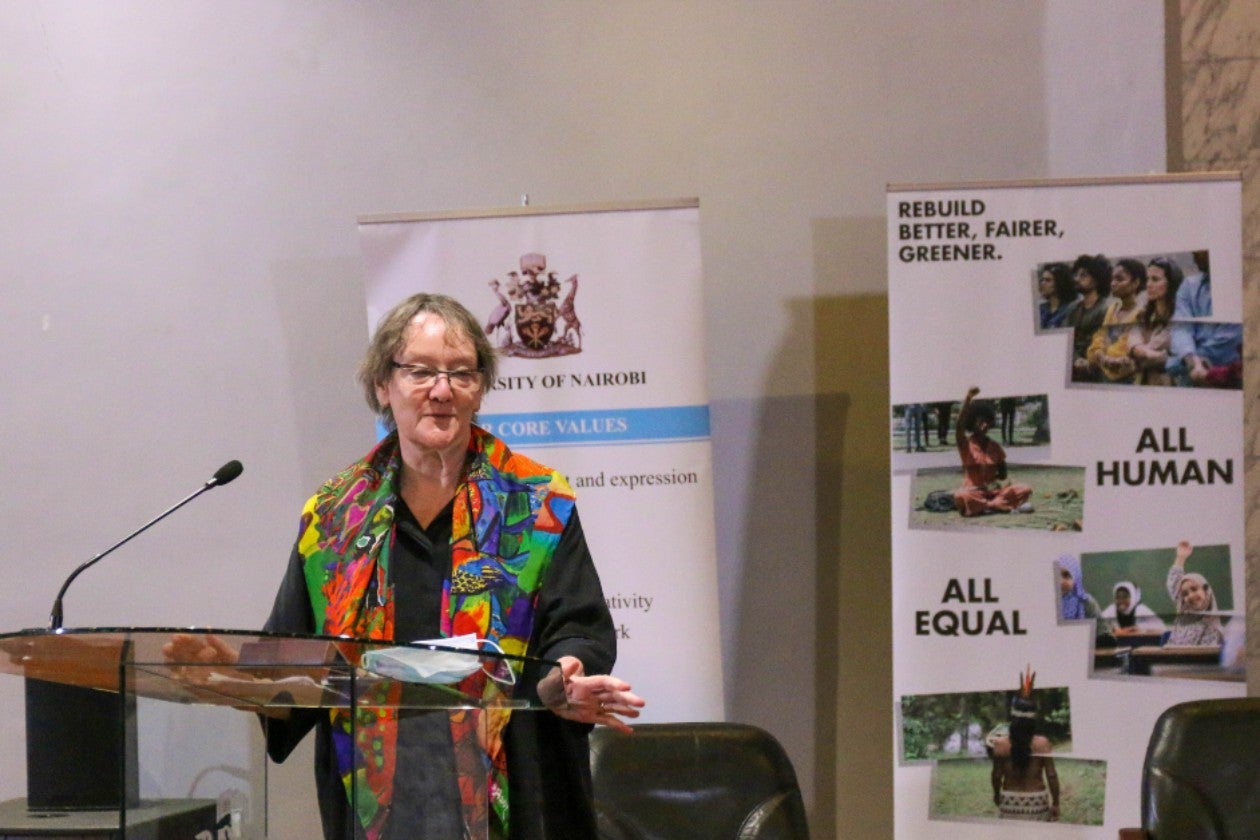Expert’s take: The biggest challenge is getting people’s minds off the ‘usual’ – which tends to be a quick protection of the organisation
Date:

Originally published by The Star
The United Nations Secretary-General appointed Victims’ Rights Advocate (VRA) Jane Connors in 2017 to lead the institution’s efforts to handle sexual exploitation and abuse committed by UN personnel. The VRA regularly visits countries with a UN presence to gain first-hand understanding of how sexual exploitation and abuse are addressed. On a recent visit to Kenya, she spoke to UN Women about her role, her visit to Kenya and the challenges confronting victims, their experiences, and putting their needs at the forefront of the UN’s fight against sexual exploitation and abuse.
Why did you visit Kenya?
I’ve been in Kenya almost two weeks, meeting with UN agencies, civil society advocates and NGOs that provide legal support. I travelled to see the humanitarian operations in the Northern part of Kenya. Kenya is a special place in terms of UN. It has the United Nations Office in Nairobi (UNON), and in addition it hosts several HQs, a UN Country Team, and 5000+ employees, in addition to implementing partners. so it’s got a big UN presence. I came to Kenya to see how the entities are working together here. They’re working together quite well, but they could step it up, particularly in regard to victims’ rights.
What is your role?
I have a global role but a small team. Additionally, I’m supported by four Senior Victims’ Rights Officers, based in the Central African Republic, the Democratic Republic of the Congo, Haiti and South Sudan. My role is fairly policy-orientated but becomes operational when I visit countries. Having people on the ground to champion victims’ rights makes a difference to them. They’re able to reach out, they are people victims can trust to accompany through complaints, investigations and arrange assistance for them. We’re trying to get more advocates on the ground. We have a couple of focal points in other countries such as Nepal and Guatemala – and are very keen to see someone who can perform such a role in Kenya.
We have a strategy, adopted by the General Assembly in 2007, which indicates the assistance to which victims and complainants are entitled. This includes medical; psychological; livelihood; shelter and legal support. The problem is that the strategy is unfunded. Usually victims are supported through gender-based violence (GBV) programming. However, these programmes are chronically underfunded, and providers may lack complete understanding of the needs or specificity of the case given that it is connected to UN personnel. Things are moving, however. In 2016, the Trust Fund in support of Victims of Sexual Exploitation and Abuse was established which currently has about $2,000,000 – and we are trying to raise more money. It creates projects that offer livelihood support so victims can go on and rebuild their lives. I encourage the agencies and programmes to pool available money into this Trust Fund where possible.
What are the biggest challenges?
The biggest challenge is getting people’s minds off the usual – which tends to focus immediately on protection of the reputation of the organization and punishment and accountability of the perpetrator. The UN Secretary General’s idea is to switch our focus so we see that, in fact, there’s a person, there’s a family, there’s a community and country really harmed by sexual exploitation and sexual abuse by United Nations personnel. We have seen progress but we need to step up efforts to prioritize victims’ rights and keep the focus on the needs of victims. These incidents occur on the ground, and while it is good to have a global advocate, we really need to strengthen our action on the ground.
We have multiple reporting systems, and we have different investigation processes. What is required is deeper collaboration and a streamlining of services for survivors. Victims don’t delineate who the perpetrator is or which entity they belong to, and support for them should not be delineated either.
Why does this happen?
Anyone who works with the UN has power- even if they’re not paid, any association with the UN means they are perceived as powerful. The people who fall victim to these wrongs are often in extremely vulnerable situations, they are hungry – and when I say hungry, they are starving; they are poor; they are seeking refuge; they’re seeking to get away from armed groups. So, you have a significant power differential. There is opportunity, and a sense of impunity. One of the reasons perpetrators get away with these wrongs is the level of under-reporting. We have reports, you can see on our website the numbers of those reports. There are not very many, and this can be misleading on the real numbers.
These behaviours need to be seen as more than just unacceptable, they are deeply harmful – normalizing the notion of exploitation and creating an exploitation economy.
What happens next?
I plan to leave in 2023 after 6 years in office. At that time, I want to be able to say that I have created a strong office. I had to argue for the establishment of the Office of the Victims’ Rights Advocate through the UN financial bodies. This was successful, and I am very happy to say we’ve expanded the number of staff by the virtue of donations from Member States. We’re going to have about 5 more new positions in 2022. I’d like to say I’ve laid down roots of this office and encouraged the nomination and funding of victims’ rights advocates on ground.